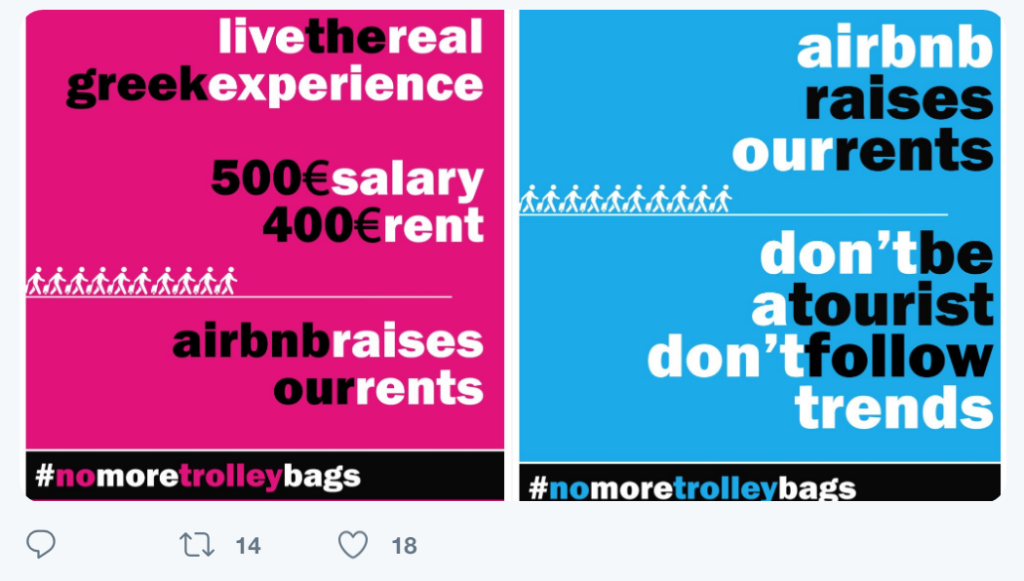
Airbnb, the most popular platform for short term renting, has been the subject of controversy in many countries in regards to the way that has transformed urban life, in popular city destinations, but tourism in general. The growth of Airbnb, accounts for evictions, restrictions in rental periods, mass gentrification, touristification of everyday life, to name a few.
On the other hand, it has also been a symbol of prosperity for some, and the potential for financial recovery and the easing of everyday financial struggles. But mainly for mass property investment. The focus will be on Athens, a city in a country in “crisis”. The AirBnb company declared that they boost the greek economy by 1.4 billion dollars within 2018 only (1).
In an age when each one of us is interpellated as a micro-entrepreneur with individual responsibility to negotiate his/her existence as a private individual matter, ‘post-crisis’ globalized capitalism provides new tools and narratives to secure its reproduction.
Giorgos Poulimenakos, Dimitris Dalakoglou
What kind of socialities are formed? And how are they produced ?
Athen’s residents have been struggling with extremely low employment levels, high living costs, high taxation and devalued properties. Airbnb was seen as the “transformative potential” (Harvey and Knox, p.25) for financial recovery, promises, dreams and fantasies to improve living standards (Harvey and Knox, p.34).
The company is using the prospect for financial alleviation as a marketing tool. We see the “monthly potential” on the website’s first page; drawing on the visitors’ location data it instantly presents a speculative monthly income to “seduce” the potential host.

Its marketing approach is to let the users / locals tell “their stories”, sharing “real life” stories of hosts that have been eased financially by renting or sharing their home, saved money and fulfilled their dreams, relieved their loneliness.



However the “transformative potential” not only influenced the However the “transformative potential” not only influenced the economy but also another internal crisis emerged; the one of the housing crisis. Within two years the city experienced immense change in the availability of housing resulting in rent prices reaching extremely high (2). Entire apartments (3) for rent dominate the Airbnb listings which the highest percentage is of hosts with multiple listings; meaning commercial operators (4).
What type of relationships and experiences develop?
Are the relationships that emerge consumer products which are required to be assessed and reviewed? The touristification of spaces and experiences may result in transient encounters, and loss of the “neighborly feeling” (Fennel, p.264). The experience services provided by the app requests locals with expertise, that can share the secrets of the area and offer “unique” and “authentic”, “one of a kind”, “hard to find” experiences. This has a great impact in the communities and social relations creating tensions between groups and conflicting interests.
And what would be the role of the state in this? Currently, we see a flux in “golden visa” issues, a collaboration with “the colonizers” and “people at the mercy of the landowners” (Harvey and Knox, p.23, 27).

References:
Harvey, P and Knox, H. (2015). Roads: An Anthropology of Infrastructure and Expertise. Ithaca: Cornell University Press.
Fennell, C. (2014). “Experiments in vulnerability: Sociability and care in Chicago’s redeveloping public housing”. City & Society 26 (2), 262-284.
Larkin, B. (2013). “The Politics and Poetics of Infrastructure”. Annual Review of Anthropology 42, 327-343.
Online Resources:
Bateman, Jessica (2019). BBC News. Athens property boom: Greeks left out as prices rise [Online]. https://www.bbc.co.uk/news/world-europe-47237923 [Accessed 12 Nov. 2019].
Dalakoglou, Dimitris and Poulimenakos, Giorgos (2018). Open Democracy. Airbnbizing Europe: mobility, property and platform capitalism: New social class distinctions are increasingly relocated outside the borders of a particular national economy, becoming transnational and carried out by ‘ordinary people’. [Online]. https://www.opendemocracy.net/en/can-europe-make-it/airbnbizing-europe-mobility-property-and/ [Accessed 12 Nov. 2019].
Greek Travel Pages (2019). Airbnb Says Home-sharing Boosted Greek Economy by $1.4bn in 2018 [Online] https://news.gtp.gr/2019/07/02/airbnb-says-home-sharing-boosted-greek-economy-1-4bn-2018/ [Accessed 12 Nov. 2019].
Inside AirBnb (2018). Inside AirBnb: Adding Data to The Debate. [Online] http://insideairbnb.com/athens/?neighbourhood=&filterEntireHomes=false&filterHighlyAvailable=false&filterRecentReviews=true&filterMultiListings=false# [Accessed 10 Nov. 2019].